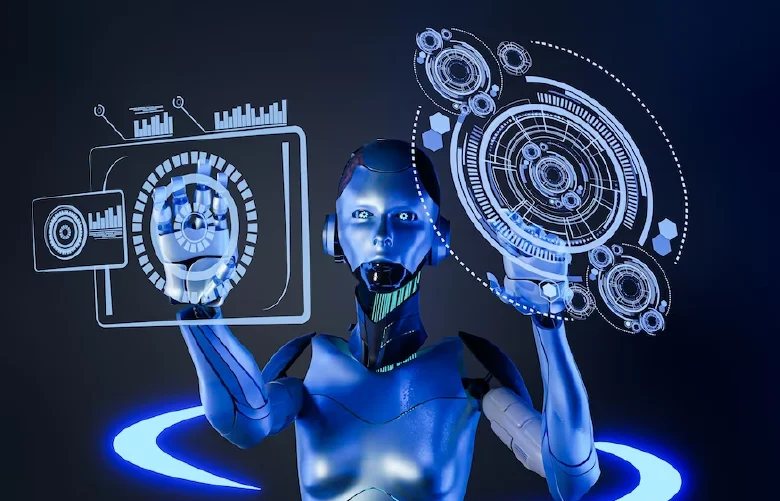While machine learning, artificial intelligence, and data science are related and belong to the same field, they each have unique definitions and uses. Although these fields may occasionally have similarities, each has its own applications.
“If you’re not confident about these fields, bookmark this article on Data Science, AI, & ML: A Look At The Growth Potential Hiring Gaps in The Market and read it later.”
Given all this, it’s natural to think about which one to choose and begin with. This is a vital thing to worry about for individuals who are aware of the growing need for data science and artificial intelligence expertise and wish to jump on board.

Data Science and Artificial Intelligence (AI) are used interchangeably. There is neither a basic hierarchy nor a correct or incorrect solution. However, knowing the key difference between data science and artificial intelligence and learning the abilities needed for particular job responsibilities will eventually influence your path to competency and your career prospects. Here is a brief about Data Science vs Machine Learning
What is Data Science?
When it comes to data science vs artificial intelligence, the former is among the domains where relevant information is gathered from unstructured data. In data science, unprocessed data points are leveraged, in addition to a range of methods derived from areas like scientific methods, statistics, and computer science, to draw conclusions.
Steps including data extraction, modification, visualization, and data upkeep are common in data science projects. Nevertheless, the subject’s breadth does not restrict a data scientist’s expertise to the aforementioned fields. They must be familiar with a variety of ideas and tools, such as machine learning, data science and artificial intelligence.

POSTGRADUATE PROGRAM IN
Data Science & AIML
Learn Data Science, AI & ML to turn raw data into powerful, predictive insights.
What is Artificial Intelligence?
When it comes to data science vs artificial intelligence, the latter is a highly overused technical terminology that is regularly used in mainstream culture. AI isn’t only associated with modernistic robots and a machine-controlled society. In fact, artificial intelligence is very different and way beyond that.
In other words, artificial intelligence aims to replicate human intelligence so that machines can perform reasoning. It is vital to provide accurate information and engage in self-correction because the major goal of AI procedures is to train robots through experiences.
To assist robots in identifying patterns and inferences, AI specialists turn to natural language processing and deep learning.
Difference Between Data Science and Artificial Intelligence
Now we have understood what Data Science and Machine Learning is. But what are the critical differences between Data Science and Machine Learning. The terms Data Science vs. Machine Learning might be related and interconnected, but they are unique and are used for different purposes. Here are the key differences between data science and artificial intelligence in a tabular format:
| Basis | Artificial Intelligence | Data Science |
|---|---|---|
| Definition | AI assists in executing data and the knowledge of various machines | Data science focuses on curating huge amounts of data for visualization and analytics |
| Technique | AI leverages both machine learning and deep learning techniques | Data science leverages the data analytics technique |
| Skills | It requires you to use algorithms for designing and development | It requires you to leverage statistical methods to design and develop projects |
| Observation | It uses data and inputs intelligence in machines to allow them respond similar to humans | It makes well-informed decisions by looking at the patterns in the data. |
| Applications | Industries, including healthcare, automation, transport, etc. | Internet search engines like Google, Yahoo, and Bing. |
| Tools Involved | AI leverages tools like Mahout, PyTorch, Scikit-Learn, TensorFlow, Shogun etc. | Data science leverages tools like SPSS, R, Keras, Python, SAS, etc. |
After looking at this chart, you can better decide whether to attend an AI course or a data science program.
Data Science Vs Artificial Intelligence: Scope
This are significant differences between Data Science and Machine Learning in terms of scope.
| Scope of Data Science | Scope of Artificial Intelligence | ||
|---|---|---|---|
| Fields | Scope | Fields | Scope |
| Cybersecurity | Identifying and preventing cyber-attacks by analyzing network traffic in areas like threat intelligence, intrusion detection, etc | Natural Language Processing | Allowing machines to comprehend and respond to human language in areas like sentiment analysis, chatbots, etc. |
| Healthcare | Enhancing patient outcomes and lowering costs by analyzing medical data in areas like personalized medicine, and more | Image & Video Analysis | Allowing machines to identify emotions, faces, and objects in areas like object detection, facial recog. |
| Business Analytics | Data analysis to enhance business results in fields like supply chain management, finance, marketing, and more. | Robotics | Allowing machines to function in the actual world in areas like manufacturing automation, drones, etc. |
Data Science Vs Artificial Intelligence: Jobs & Salary
Data Science and Artificial Intelligence both are a lucrative career options. At times amid AI vs data science, it is assumed that both concepts are the same, however, there is major difference between Artificial Intelligence vs Machine Learning in terms of salary.
| Data Science Jobs | Salary Range | AI Jobs | Salary Range |
|---|---|---|---|
| Data Analyst | $47,000 – $89,000 | Software Engineer | $66,000 – $133,000 |
| Data Entry Specialist | $30,000 – $57,000 | Solutions Architect | $90,000 – $144,000 |
| Data Scientist | $70,000 – $137,000 | Machine Learning Engineer | $79,000 – $156,000 |
| Data Engineer | $67,000 – $134,000 | AI Researcher | $68,000 – $179,000 |
| Data Science Manager | $103,000 – $187,000 | Chief Technology Officer | $81,000 – $395,000 |
Artificial Intelligence vs Data Science: Skill Required
The following are the essential technical abilities needed to pursue a career in data science and artificial intelligence (AI):

- programming knowledge in any language, including Java, Python, or C++,
- understanding of data analysis and data modelling
- knowledge of probability and statistics
- knowing distributed computing
- a thorough understanding of machine learning methods
Artificial Intelligence vs Data Science: Applications
Even if data science and machine learning overlap, there is a difference in their specific functionalities and have respective application areas. When it comes to data science vs artificial intelligence, both come with their unique applications. While data science applications typically involve recommendation engines, speech recognition, and computer vision, artificial intelligence applications include sentiment analysis, predictive modelling, classification, anomaly detection, and pattern identification.
Artificial Intelligence vs Data Science: Tools
When it concerns data science and artificial intelligence, both require the use of different tools. The necessary tools for artificial intelligence include Scikit-Learn, Kaffe, PyTorch, TensorFlow, Shogun, Mahout, etc. However, the tools required for data science include R, Python, SAS, SPSS, Keras, and others.
Conclusion
Thus, extensive analysis of artificial intelligence and data science we conclude that both have different purpose and uses This guide covers every aspect of the two fields: data science and artificial intelligence and how they can be used interchangeably. While data science tools handle computational calculations on data, AI tools create predictions based on data. Both data science and artificial intelligence professions are in demand in today’s current environment.
Your area of interest is all that is necessary for you to comprehend. A career in data science may appeal to you if you are strong at analysing data; however, if you prefer the ideas of artificial intelligence and its enormous potential, you would do better in that sector.
Check this post on ‘how to successfully transition to a career in data science: everything you need to know’ to get started today!
Are Artificial Intelligence and Data Science the same?
Which is better: Artificial Intelligence or Data Science?
Who earns more: AI or data science?
Is Data Science Required for Machine Learning?
Updated on August 5, 2024
